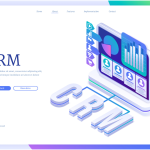CRM Solutions for Financial Services
Customer Relationship Management (CRM) is more than just a buzzword in the fast-paced world of financial services; it is a critical success tool. CRM refers to the strategies, tools, and practises that firms use to manage and analyse customer contacts throughout their lifecycle. CRM solutions are critical for creating meaningful client interactions, guaranteeing regulatory compliance, and strengthening cybersecurity safeguards.
The Benefits of CRM in Financial Services
Implementing a robust CRM system offers many benefits for financial service providers:

- Improved Compliance: As financial regulations evolve, financial institutions must prioritise compliance. CRM systems improve compliance by centralising client data, enabling audit trails, and automating regulatory reporting.
- Enhanced Security: Financial data is susceptible, thus security is our top priority. CRM platforms have strong security features like encryption, role-based access control, and data masking to protect sensitive data and reduce cybersecurity risks.
- Effective Relationship Management: Developing and sustaining client connections is critical to the success of financial services companies. CRM solutions enable firms to personalise interactions, anticipate client needs, and provide tailored financial advice, resulting in increased client loyalty and retention.
Drawbacks of Traditional CRM Solutions
Despite their numerous advantages, traditional CRM solutions have faced multiple obstacles in the financial services sector:
- Siloed Data: In many firms, client data is spread across multiple platforms, making it difficult for departments to share and collaborate seamlessly.
- Manual Processes: Manual data entry and lengthy workflows are frequent in traditional CRM systems, resulting in inefficiencies and errors that jeopardise data accuracy and integrity.
- Lack of Customisation: Off-the-shelf CRM solutions frequently lack the flexibility to meet the financial services industry’s specific requirements and regulatory complexities.
Overcoming challenges with CRM in financial services
To solve these difficulties, CRM solutions designed exclusively for the financial services sector have emerged, including
- Unified Data Management: Financial CRM products interface with core banking systems and other relevant data sources to provide a single view of client information and interactions across all channels.
- Automation and Compliance Tools: Advanced automation capabilities and built-in compliance tools simplify regulatory processes, assuring adherence to industry standards and lowering the risk of noncompliance.
- Customisation and Scalability: Financial CRM solutions include configurable processes, data fields, and reporting capabilities, allowing firms to respond to changing regulatory needs and scale their operations.
Adoption and Conclusion

CRM is a must-have in the competitive financial services industry. Financial institutions can improve compliance, reinforce security measures, and elevate client interactions by utilising CRM solutions adapted to their industry’s specific needs. While the initial investment and execution may appear difficult, the long-term advantages greatly surpass the expenditures.
To summarise, CRM acts as a driver for innovation and growth in the financial services industry, allowing firms to overcome regulatory complexity, strengthen cybersecurity defences, and provide improved client experiences. Financial institutions that embrace CRM as a strategic imperative will be better positioned for long-term success in an increasingly dynamic and customer-centric economy.








